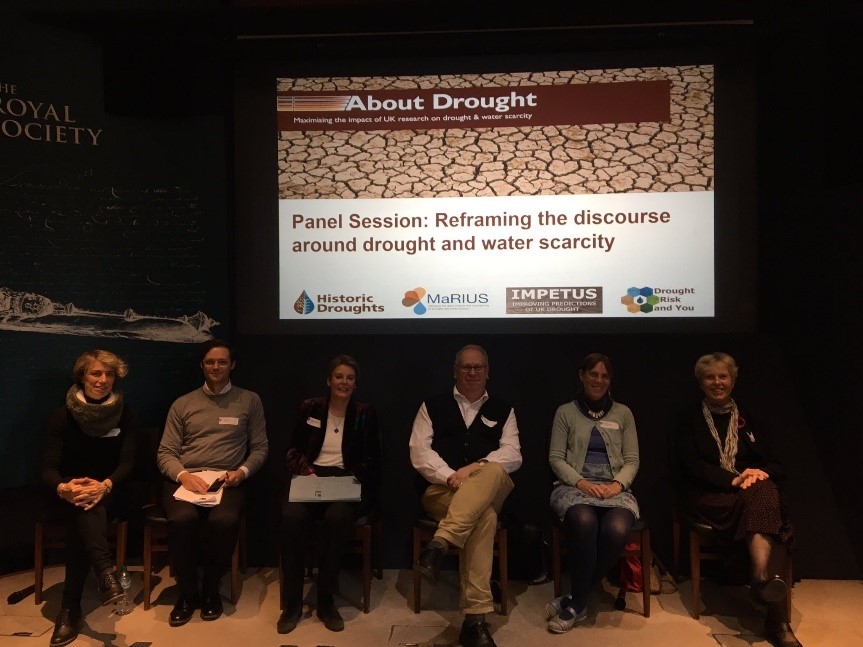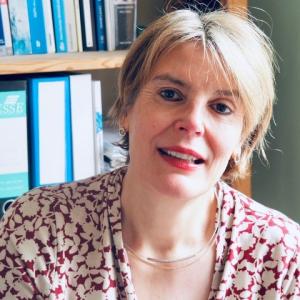Reframing the discourse about drought in the UK
Associated people
CSLS researchers Bettina Lange and Kevin Grecksch participated in a conference on the 7th of November 2019 at the Royal Society, London about drought management.
At the About Drought Download event, we brought together a mix of researchers with expertise in science communication, social science and applied storytelling for a lively panel session, with participants. We posed ourselves and our audience of stakeholders from different water related professions four pithy questions:

- Why is drought so challenging to communicate?
- What facilitates drought talk?
- What insights have been gained from Drought &Water Scarcity research?
- How might these insights feed into communication strategies, targeting different stakeholder groups including the ‘general public’?
Each of the panellists started by giving a context-setting, flash stimulus talk on various themes around communicating, and engaging with, drought risk and sharing audio resources as prompts to thinking.
- Lindsey McEwen (UWE Bristol) set the scene in by articulating the challenge of visualising drought as a hidden risk (unlike flooding that has high visually impact and is emotionally charged), exploring drought myths that pervade the UK (Britain is wet and it is always raining…);
- Emma Weitkamp (UWE Bristol) mapped barriers in (to) drought risk communication (DRC), articulating possible frameworks for thinking about DRC strategies;
- Antonia Liguori and Mike Wilson (Loughborough University) shared the potential of applied storytelling approaches in the Drought Risk and You (DRY) research project. This included the role of storying in promoting flatter hierarchies of knowledge (for producers and implementers of knowledge); and
- Bettina Lange and Kevin Grecksch (University of Oxford) articulated work exploring the social norms that underpin water efficiency communications, explicitly targeting the public sector.
The Panel (L to R): Dr Antonia Liguori (Loughborough); Dr Kevin Grecksch (Oxford); Dr Bettina Lange (Oxford); Professor Mike Wilson (Loughborough); Dr Emma Weitkamp (UWE Bristol) and Professor Lindsey McEwen (UWE Bristol)
Participants from the floor then both posed a series of questions to the panel, and shared their observations. Lively discussion ensued around:
- similarities and differences between climate change communication and drought risk communication;
- engaging with climate through weather;
- use of social norms in water company communications around water efficiency (including parallels to social norming of towel use in hotels);
- the need for educating different publics about where their water supply comes from, and when and how this might happen; and starting early to communicate different stages of water scarcity;
- the role of different messengers and models of communication (e.g. working with allotment holders as a water sensitive and creative group); and
- the need to bring learning about droughts and adaptation out of the emotionally charged situation within actual events.
Examples were cited about celebrations of water sources, including attributing legal personhood to rivers, and reconnecting to the spirituality of water. Our discussions were bounded by the time constraints of a conference, demonstrated the need to continue progressing ideas and learning around this topic, and the importance and value to both of connecting stakeholders and researchers. As follow up, we share some outputs from the DRY and About Drought projects below.
Follow up resources:
The DRY project has produced two resources: a Research Summary about drought risk communication, and Communication Brief on drought risk communication
The ENDOWS project has produced a Primer on Water Efficiency in the Public Sector: the role of Social Norms.



